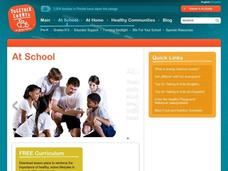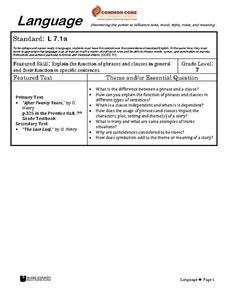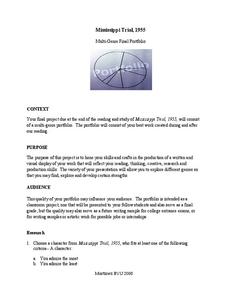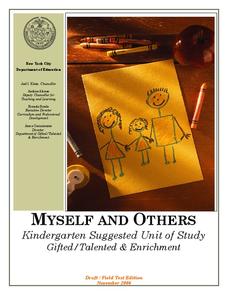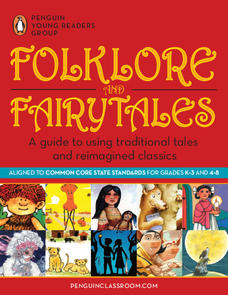Curated OER
Is Modern Culture Ruining Childhood?
There are a lot of different ways a learner could respond to this New York Times article discussing the effects of modern culture on childhood. After reading the article, pupils construct a thoughtful blog post. The guiding questions...
Curated OER
The DIY: A Hands-On Look at the New Industrial Revolution
Upper graders explore the new industrial revolution and how the tech boom in recent years is similar and different to the Industrial Revolution of the past. They watch a video, explore web sites, and discuss what they see. They work...
Curated OER
Compare the Presidents
How are Nicolas Sarkozy and Barack Obama similar? How are they different? Look at two visual representations of them; what kind of first impression does they give you? After comparing the presidents, learners complete a proverb matching...
Curated OER
Full Esteem Ahead
Young learners who feel good about themselves will fare better in the long run than those who do not have a high level of self-esteem. Introduce youngsters to what it means to like themselves. Discuss positive characteristics and...
Hawaiʻi State Department of Education
Angles on Kandinsky
Not only is Wassily Kandinsky fun to say, his art contains tons of angles. Learners discuss Kandinsky's music-inspired abstract art and four types of angles. They search one of his paintings for obtuse, right, straight, and acute angles,...
Wake County Public Schools
Language
Have your class doing everything from reading literature, analyzing literary devices, identifying independent and dependent clauses, discussing, and writing creatively with the rich resource found here. After a mini lesson on independent...
California Academy of Science
Snakes and Lizards Length and Movement
Snakes and lizards can be very tiny or very long. Your class will get out their rulers to see just how big snakes and lizards can be. They discuss several different reptiles by reading the included animal fact cards, then each small...
American Chemical Society
Investigating the Line
Note that this lesson is best paired with the preceding lesson in the unit. In that lesson, elementary physical scientists observed that the color coating of M&Ms® candies do not mix when dissolved off of the chocolate surface. Now...
Exploratorium
Cheshire Cat
Divide your field of vision in two and see what happens when your two eyes behold two different scenes! This is a way to demonstrate to body-systems buffs how the two eyes usually blend pictures to create a three-dimensional view. This...
Film English
Father and Son
Explore word relationships and the relationships between people with an interesting lesson. Learners practice pairing words that typically go together and write brief narratives using these words. They then go through a similar process,...
Elementary School Counseling
Feelings Glasses Activity
What if your feelings could change in a single instant just by putting on a new pair of glasses? Explore different types of feelings with your youngsters with this activity, and consider a world of possibilities after introducing this...
Curated OER
Mississippi Trial, 1955: Culminating Writing Project (Multi-Genre Final Portfolio)
Designed as the final project concluding a study of Mississippi Trial, 1955, readers select a character from Crowe's novel and craft a portfolio of six entries that reveal not only aspects of the character, but similarities between...
EngageNY
Summarizing Bivariate Categorical Data with Relative Frequencies
It is hard to determine whether there is a relationship with the categorical data, because the numbers are so different. Working with a familiar two-way table on super powers, the class determines relative frequencies for each...
New York City Department of Education
Myself and Others
Self reflection is an important skill to reinforce in our children, and it's especially helpful to help them realize who they are in the context of their environment. A collection of lessons about self image and community encourage...
Sociology Central
Society Is Like...
To introduce the idea of different theoretical views about the nature of society, class members engage in a sociology activity that asks them to create an analogy between society and another concept, and then to explain the parallels.
Hood River County School District
Text Structure: Features and Organization
Teach learners how to interact with both fiction and non-fiction text with a packet of activities and worksheets. After looking over text structure and the difference in text features between different types of writing,...
Code.org
Number Systems
Generating a system of shapes. Groups work together to create a number system using three different shapes as symbols. The groups should come up with the rules that generate all the possible permutations of the three shapes.
EngageNY
The Graph of a Function
Mathematics set notation can be represented through a computer program loop. Making the connection to a computer program loop helps pupils see the process that set notation describes. The activity allows for different types domain and...
Museum of Tolerance
Documents That Shape Society
The Bill of Rights is a foundational document of American democracy, much like the Nuremberg Laws were a foundational document of the Reichstag of Nazi Germany. But that's where their similarities end. Engage high schoolers in a...
National Park Service
A Peace Park
Piece together American and Canadian culture by learning about peace parks! Scholars discuss differences between Waterton Lakes National Park and Glacier National Park as a group. The newly-informed pupils answers questions about this...
Penguin Books
Folklore and Fairytales: A Guide to Using Traditional Tales and Reimagined Classics
Every culture has its own stories to tell. An interesting educator's guide shares a large collection of fairytales and folktales, some from different cultures and some re-creations of classics. A summary and brief teaching ideas...
Judicial Learning Center
The Appeal Process
Why doesn't the Supreme Court hear testimony from witnesses? How do they complete an entire proceeding in less than two hours? A helpful lesson guides scholars of criminology through these and other questions by explaining how appeals...
Ford's Theatre
How Perspective Shapes Understanding of History
The Boston Massacre may be an iconic event in American history, but perhaps the British soldiers had another point of view. Using primary sources, including reports from Boston newspapers and secondary sources from the British...
Discovery Education
Smoke on the Water
How do clouds form? Learners demonstrate the formation of clouds and the water cycle by testing four different setups in a plastic bottle. They identify the key components of a cloud to help them understand the process of cloud...



